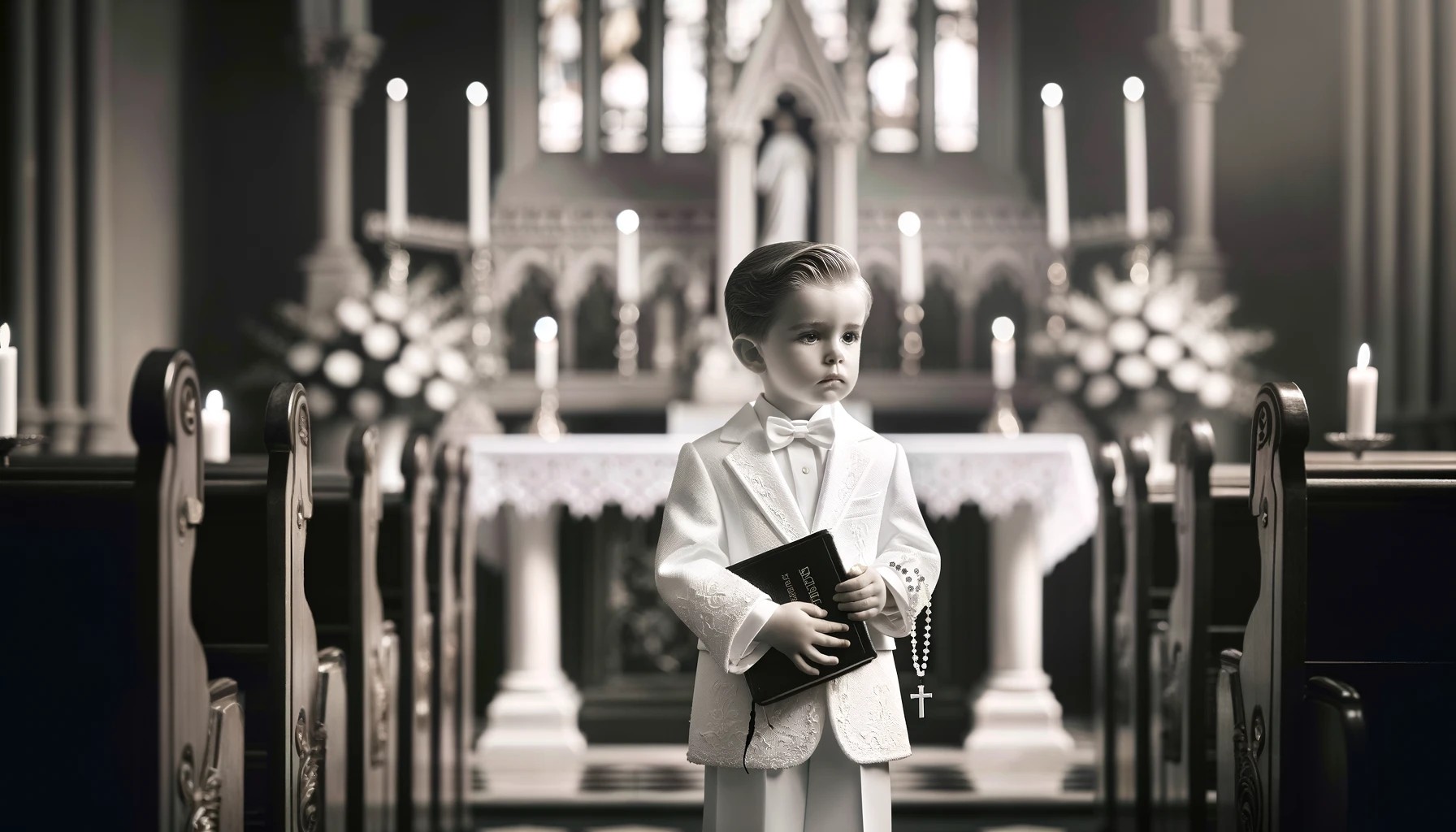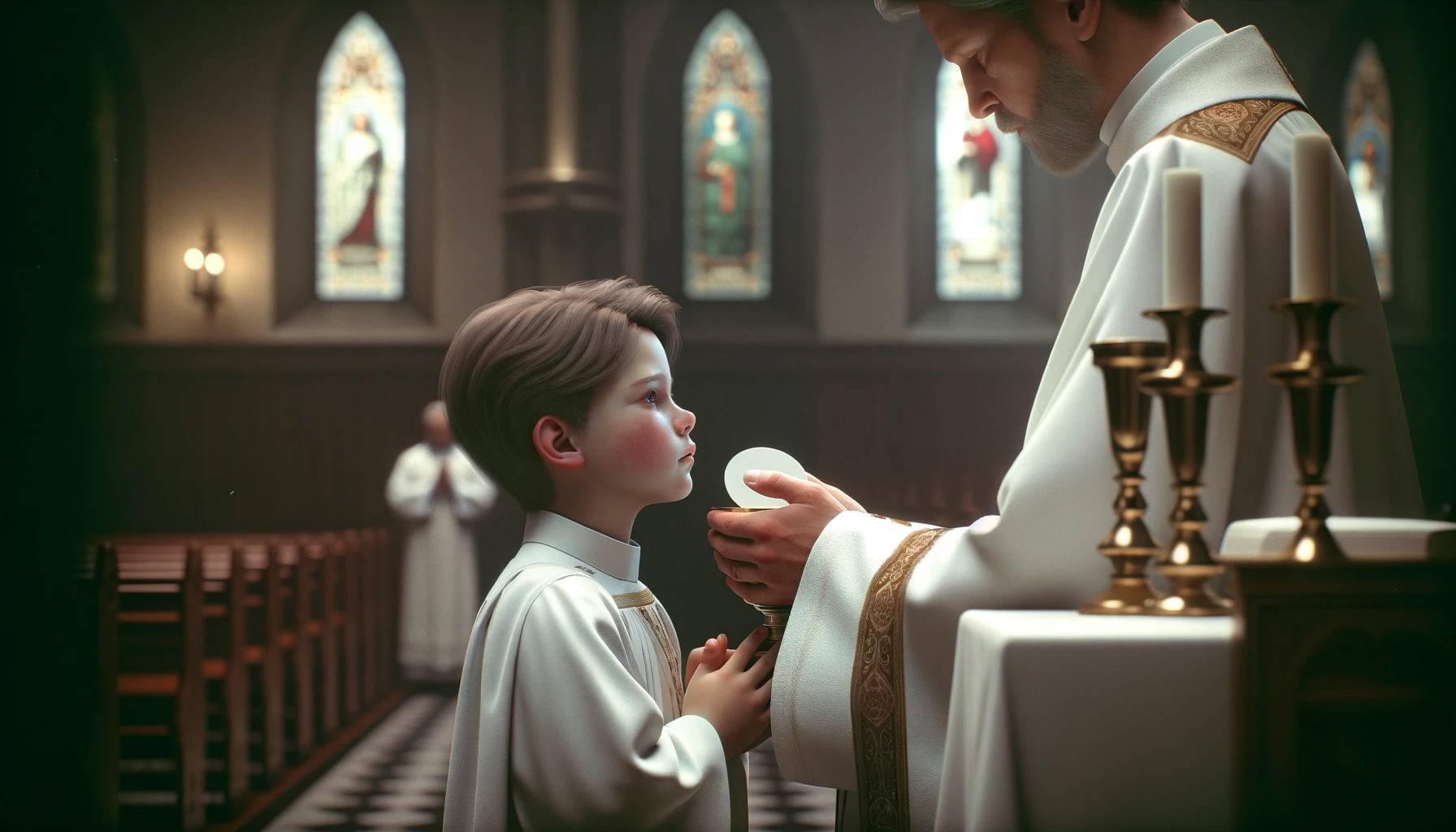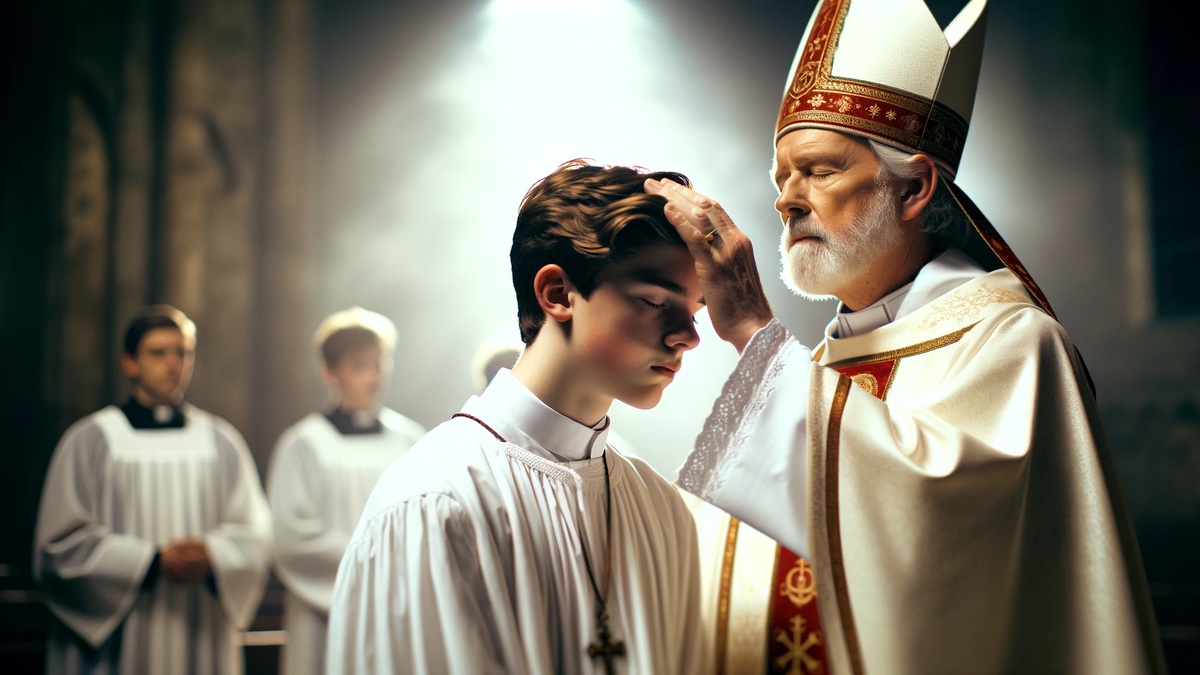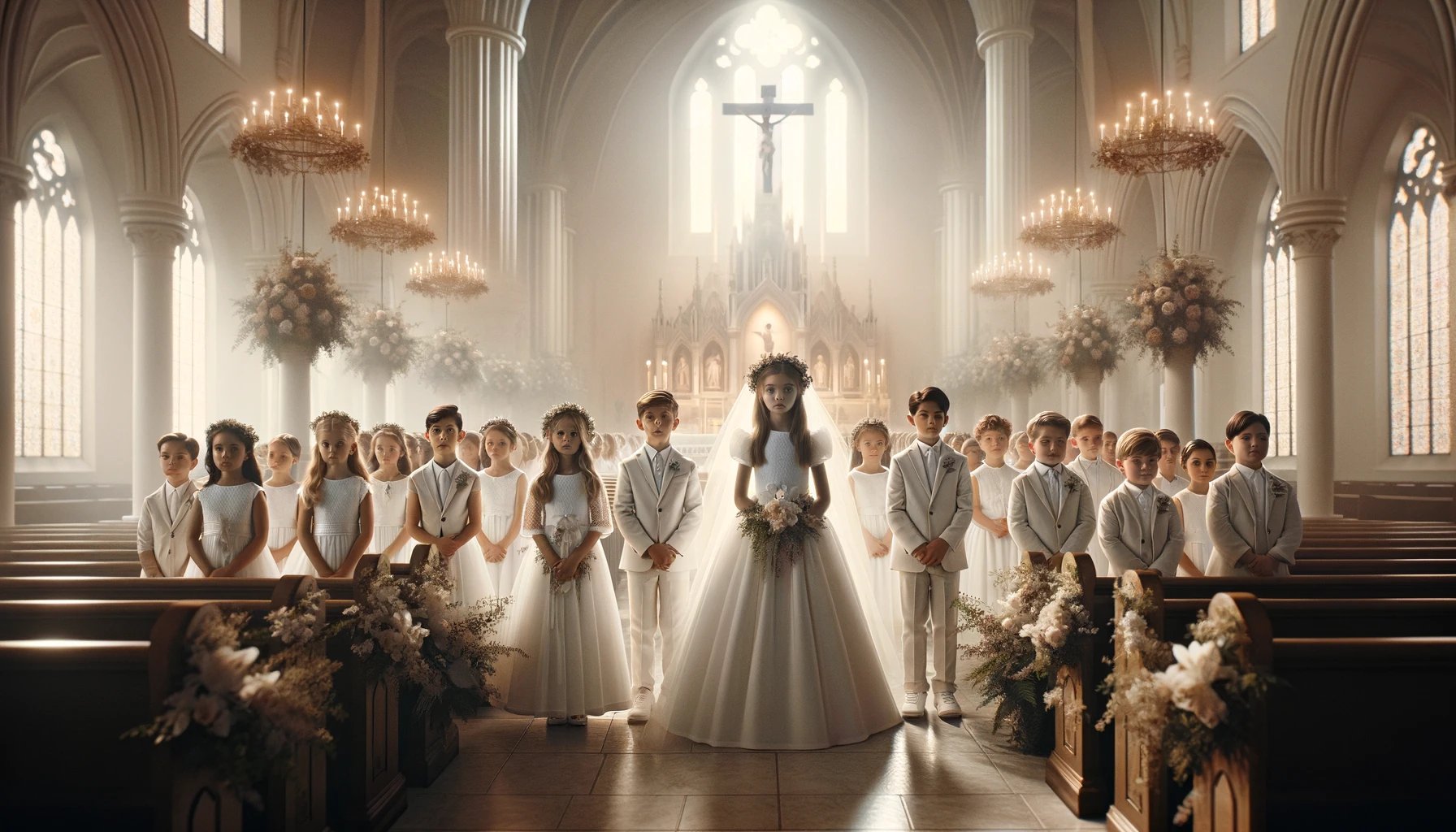Home>Theology and Spirituality>What Do You Do In Your First Communion
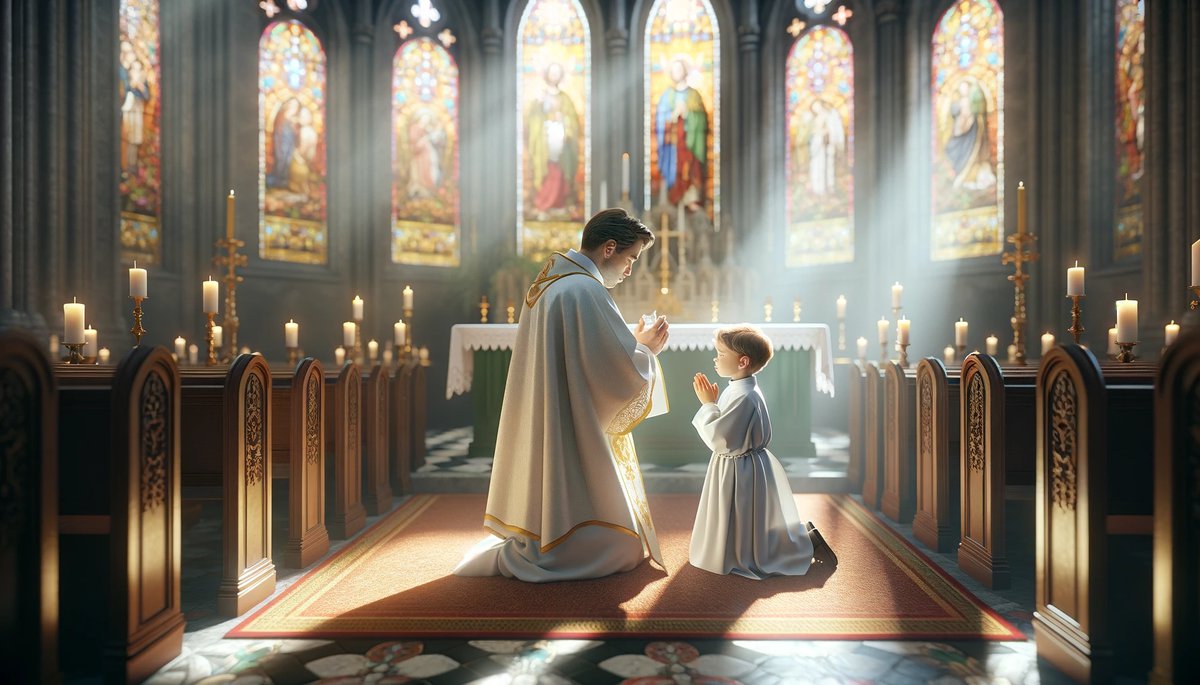

Theology and Spirituality
What Do You Do In Your First Communion
Published: February 25, 2024
Peter Smith, Editorial Director at Christian.net, combines deep insights into faith, politics, and culture to lead content creation that resonates widely. Awarded for his contributions to religious discourse, he previously headed a major organization for religious communicators, enhancing dialogue on faith's societal impacts.
Celebrate your child's first communion with meaningful traditions and spiritual guidance. Discover the significance of this special sacrament in theology and spirituality.
(Many of the links in this article redirect to a specific reviewed product. Your purchase of these products through affiliate links helps to generate commission for Christian.net, at no extra cost. Learn more)
Table of Contents
Introduction
First Communion is a significant milestone in the lives of many young Christians, marking an important step in their spiritual journey. It is a sacred and joyous occasion that holds deep meaning within the Christian faith. This special event, often celebrated with great enthusiasm and reverence, symbolizes the initiation of a child into the Eucharistic community, signifying their growing understanding and acceptance of the teachings of Jesus Christ.
The First Communion ceremony is a cherished tradition in various Christian denominations, including the Catholic Church, Anglican Church, and Lutheran Church, among others. It is a time of great anticipation and spiritual preparation for both the children and their families. The significance of this sacrament is rooted in the belief that through the reception of the Holy Eucharist, participants are united with Christ in a profound and intimate way, strengthening their bond with the divine and the community of believers.
As children embark on this sacred rite of passage, they are encouraged to approach it with reverence, humility, and a sense of awe. It is a time for them to deepen their understanding of the spiritual significance of the Eucharist and to reflect on the teachings of Jesus, who instituted the sacrament during the Last Supper. Through this experience, children are invited to partake in the spiritual nourishment offered by the body and blood of Christ, fostering a deeper connection to their faith and the Christian community.
The journey towards First Communion is a time of spiritual growth and learning, as children engage in religious education and preparation to receive the sacrament. It is a period filled with anticipation, as they eagerly await the moment when they will partake in the Eucharistic celebration for the first time. This sacred occasion is not only a personal milestone for the children but also a time of joy and pride for their families and the faith community as a whole.
In the following sections, we will delve deeper into the significance of First Communion, the preparation involved, the ceremony itself, and the meaningful ways in which families and communities celebrate this momentous occasion. Let us embark on a journey to explore the beauty and spiritual depth of First Communion, a cherished tradition that holds a special place in the hearts of many.
Read more: What Do Godparents Do At First Communion
Understanding the significance of First Communion
First Communion holds profound significance within the Christian faith, serving as a pivotal moment in a child's spiritual journey. At its core, this sacrament symbolizes the initiation of young believers into the Eucharistic community, signifying their growing understanding and acceptance of the teachings of Jesus Christ. It is a sacred and transformative experience that fosters a deeper connection to the divine and the Christian community.
The act of receiving the Holy Eucharist during First Communion is deeply rooted in the biblical narrative of the Last Supper, where Jesus instituted the sacrament, instructing his disciples to partake in the bread and wine, which he declared to be his body and blood. This act of sharing in the Eucharistic meal represents the spiritual nourishment offered by Christ, symbolizing the unity of believers with the divine and with one another.
For children preparing to receive First Communion, this sacrament represents a significant milestone in their faith formation. It marks a moment of spiritual awakening and understanding as they begin to comprehend the profound mystery of the Eucharist and its centrality to the Christian faith. Through this experience, children are invited to deepen their relationship with Jesus Christ and to embrace the teachings of love, compassion, and selflessness exemplified by him.
Furthermore, First Communion serves as a tangible expression of unity within the Christian community. As children partake in the Eucharistic celebration for the first time, they are welcomed into a fellowship of believers, where they are embraced and supported in their spiritual journey. This sense of belonging and communal participation underscores the significance of First Communion as a unifying and transformative experience for young Christians.
In essence, the significance of First Communion extends beyond a mere ritual; it embodies a profound spiritual encounter that shapes the faith identity of children and strengthens their connection to the Christian community. It is a sacred moment that resonates deeply with the teachings of Jesus Christ, inviting young believers to partake in the divine mystery of the Eucharist and to embrace the love and grace it represents. Through this sacrament, children are initiated into a deeper understanding of their faith, marking the beginning of a lifelong journey of spiritual growth and communion with God and fellow believers.
Preparing for First Communion
The journey towards First Communion is a time of spiritual growth and preparation, encompassing a series of meaningful steps that culminate in the reception of this sacred sacrament. For children, this period of preparation is a significant and transformative experience, as they engage in religious education, spiritual reflection, and practical training to fully comprehend the significance of the Eucharist and the responsibilities that come with receiving it.
The preparation for First Communion typically begins within the context of the family and the faith community. Parents, as primary educators of their children's faith, play a crucial role in nurturing their understanding of the Eucharist and guiding them through the preparation process. Families often participate in religious education programs offered by their local parish or church, where children receive instruction on the significance of the Eucharist, the meaning of the sacrament, and the practical aspects of receiving Holy Communion.
In addition to formal religious education, children preparing for First Communion often engage in spiritual formation activities, such as prayer, reflection on the life of Jesus, and acts of service within their community. These experiences are designed to deepen their connection to their faith and instill in them the values of compassion, empathy, and love, which are central to the teachings of Jesus Christ.
A key aspect of the preparation process involves receiving the Sacrament of Reconciliation, also known as Confession. This sacrament provides children with the opportunity to seek forgiveness for their sins and to experience the grace of reconciliation, thereby approaching the Eucharist with a pure heart and a renewed spirit. Through the Sacrament of Reconciliation, children are encouraged to reflect on their actions, seek forgiveness, and embrace the opportunity for spiritual renewal as they prepare to receive the body and blood of Christ.
Furthermore, practical instruction on the proper reception of Holy Communion is an integral part of the preparation process. Children learn about the significance of the Eucharistic elements, the reverent manner in which to approach the altar, and the spiritual disposition required to receive the sacrament. This practical training instills in them a sense of reverence and understanding of the sacredness of the Eucharist, preparing them to partake in this profound act of communion with Christ and the faith community.
As children progress through the stages of preparation, they are supported by their families, catechists, and the broader faith community, all of whom play a vital role in nurturing their spiritual growth and understanding. The journey towards First Communion is a time of learning, reflection, and spiritual enrichment, as children eagerly anticipate the moment when they will partake in the Eucharistic celebration for the first time, marking a significant milestone in their faith journey.
The ceremony of First Communion
The ceremony of First Communion is a deeply significant and joyous occasion that marks the culmination of a child's spiritual preparation and the beginning of their active participation in the Eucharistic celebration. This sacred event is typically held within the context of a church or parish, where family members, friends, and members of the faith community gather to witness and support the children as they receive the body and blood of Christ for the first time.
The ceremony is often characterized by a sense of reverence, anticipation, and celebration, as children, dressed in their finest attire, approach the altar to partake in the Eucharistic feast. The atmosphere is filled with a palpable sense of spiritual significance, as the young communicants, accompanied by their parents and godparents, stand before the altar to receive the sacrament.
The First Communion ceremony is typically integrated into a special Mass, where the focus is on the children and their initiation into the Eucharistic community. The Mass is adorned with symbolic rituals and prayers, creating a sacred and memorable experience for the young participants. As the congregation gathers, hymns of praise and thanksgiving resonate throughout the church, setting a reverent and uplifting tone for the ceremony.
During the Mass, the children play an active role in the liturgy, participating in readings, prayers, and hymns, thereby demonstrating their growing understanding of the faith and their readiness to embrace the responsibilities of receiving the Eucharist. This active involvement underscores the significance of their initiation into the faith community and their willingness to embrace the teachings of Jesus Christ.
The pinnacle of the ceremony is reached when the children approach the altar to receive the Holy Eucharist. With a sense of awe and humility, they partake in the bread and wine, which symbolize the body and blood of Christ. This sacred moment is accompanied by profound prayers and blessings, as the children are welcomed into the fullness of the Eucharistic celebration, uniting with Christ in a deeply spiritual and transformative manner.
Following the reception of the Eucharist, the ceremony is often marked by expressions of joy and gratitude, as families and the faith community come together to celebrate this momentous occasion. It is a time for heartfelt embraces, words of encouragement, and the sharing of blessings, as the children are affirmed in their faith and welcomed into the community of believers.
In essence, the ceremony of First Communion is a sacred and memorable event that holds deep spiritual significance for the children, their families, and the faith community. It is a time of profound reverence, joy, and communal celebration, marking the beginning of a lifelong journey of faith and communion with Christ and the Christian community.
Celebrating after First Communion
After the solemn and spiritually enriching First Communion ceremony, it is customary for families to partake in joyous celebrations to honor and commemorate this significant milestone in the lives of the young communicants. The post-Communion festivities are a time for families, friends, and the faith community to come together in a spirit of jubilation, gratitude, and communal bonding.
The celebrations often extend beyond the church setting, as families host gatherings and receptions to honor the children who have received the Holy Eucharist for the first time. These gatherings are marked by a sense of festivity and warmth, as loved ones gather to offer their congratulations and support to the newly initiated communicants.
In many cultures, it is a tradition for families to organize special meals or receptions following the First Communion ceremony. These gatherings provide an opportunity for relatives and friends to share in the joy of the occasion, offering words of encouragement and blessings to the children as they continue their journey of faith. The atmosphere is filled with laughter, love, and a profound sense of togetherness, as families celebrate the spiritual growth and commitment of the young communicants.
During these post-Communion celebrations, it is common for the children to receive symbolic gifts and tokens of remembrance from their loved ones. These gifts often hold sentimental value, serving as mementos of the special day and as reminders of the enduring support and love of family and friends. Additionally, the children may receive religious items such as rosaries, crosses, or prayer books, symbolizing the continuation of their faith journey and the importance of spiritual devotion in their lives.
The post-Communion celebrations also provide an opportunity for the children to express their gratitude and appreciation to their families and the faith community. Through heartfelt gestures and words of thanks, the young communicants convey their deep sense of joy and reverence for the support and guidance they have received on their path to First Communion. This expression of gratitude fosters a spirit of humility and appreciation, reinforcing the values of faith, love, and community that are central to the Christian tradition.
In essence, the celebrations that follow First Communion serve as a testament to the joy, love, and unity that permeate this sacred occasion. They are a time for families and communities to come together in celebration, offering their unwavering support and encouragement to the children as they embark on a new chapter of their faith journey. These post-Communion festivities not only mark the culmination of the ceremony but also signify the beginning of a lifelong commitment to faith, love, and spiritual growth for the young communicants.
Read more: What Do You Say For A First Communion
Conclusion
In conclusion, the journey towards First Communion is a profound and transformative experience that holds deep spiritual significance for children, families, and the faith community. This sacred sacrament marks a pivotal moment in the lives of young believers, signifying their initiation into the Eucharistic community and their growing understanding of the teachings of Jesus Christ. The significance of First Communion extends beyond a mere ritual; it embodies a profound spiritual encounter that shapes the faith identity of children and strengthens their connection to the Christian community.
The preparation for First Communion is a time of spiritual growth and learning, encompassing religious education, spiritual reflection, and practical training. Children engage in activities that deepen their understanding of the Eucharist, foster a sense of reverence, and instill in them the values of compassion, empathy, and love central to the teachings of Jesus Christ. The support of families, catechists, and the broader faith community plays a vital role in nurturing the spiritual growth and understanding of the children as they eagerly anticipate the moment when they will partake in the Eucharistic celebration for the first time.
The ceremony of First Communion is a deeply significant and joyous occasion, characterized by a sense of reverence, anticipation, and celebration. The children, dressed in their finest attire, approach the altar to receive the body and blood of Christ for the first time, marking the beginning of their active participation in the Eucharistic celebration. The Mass is adorned with symbolic rituals and prayers, creating a sacred and memorable experience for the young participants, as they actively engage in the liturgy, demonstrating their readiness to embrace the responsibilities of receiving the Eucharist.
Following the solemn and spiritually enriching First Communion ceremony, families partake in joyous celebrations to honor and commemorate this significant milestone in the lives of the young communicants. These post-Communion festivities are a time for families, friends, and the faith community to come together in a spirit of jubilation, gratitude, and communal bonding, marking the beginning of a lifelong commitment to faith, love, and spiritual growth for the young communicants.
In essence, First Communion is a sacred and transformative experience that resonates deeply with the teachings of Jesus Christ, inviting young believers to partake in the divine mystery of the Eucharist and to embrace the love and grace it represents. It is a cherished tradition that holds a special place in the hearts of many, marking the beginning of a lifelong journey of faith and communion with God and fellow believers.





